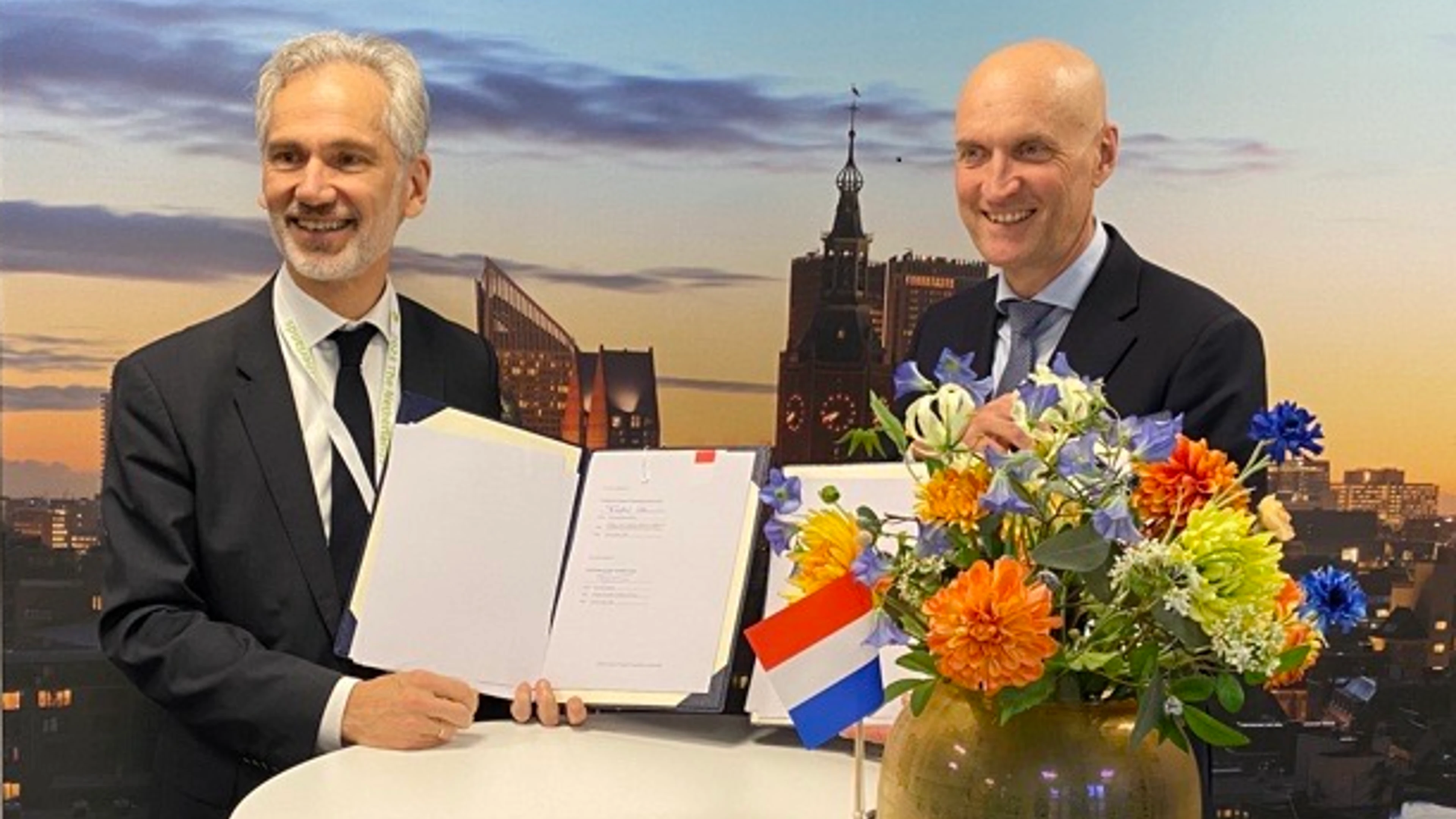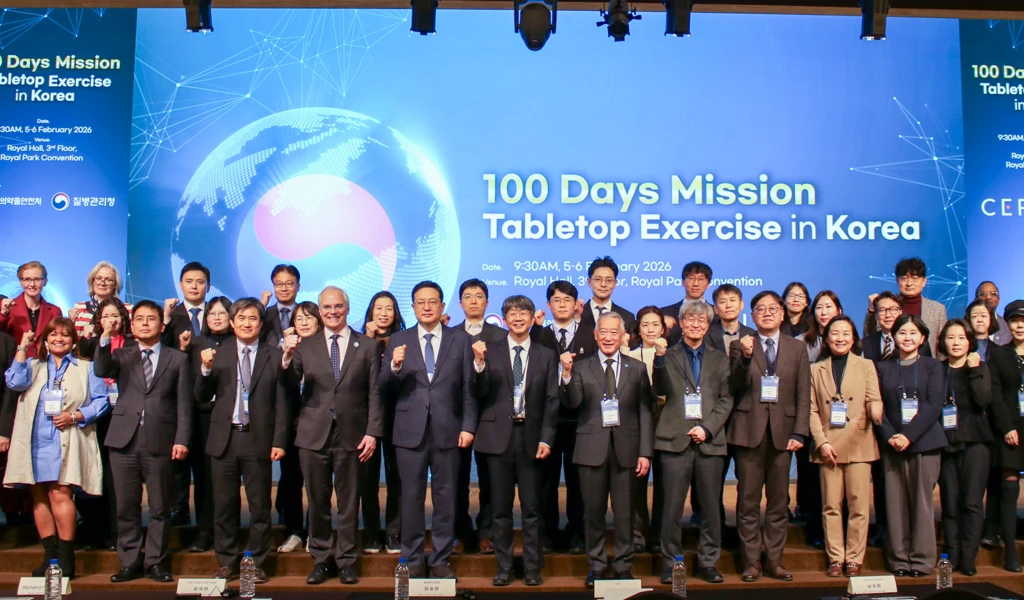Dutch Ministry of Health, Sports and Welfare provide additional EUR 14 million to improve global outbreak readiness
Increased contribution was officially recognised today at the World Local Production Forum in the Netherlands
Netherlands Government first invested in CEPI in 2020 to advance CEPI's COVID-19 vaccine portfolio
06 November 2023 — THE HAGUE, Netherlands; OSLO, Norway — The Netherlands Ministry of Health, Sports and Welfare today announces an additional EUR 14 million contribution to CEPI to advance global vaccine R&D and manufacturing and better prepare for future epidemic and pandemic threats. The contribution was formalised today at a signing ceremony held by Minister of Health, Welfare and Sport for the Netherlands, Ernst Kuipers, and Deputy CEO of CEPI, Frederik Kristensen, at the World Local Production Forum, a WHO event co-hosted by the Netherlands and Indonesia in The Hague.
The increased investment, which builds on the initial EUR 50 million contribution from the Netherlands to CEPI in 2020, will enable Dutch and international researchers to accelerate their knowledge and scientific innovations gained during the COVID-19 pandemic and give the world a fighting shot of stopping the next pandemic, caused by an unknown or as-yet-unidentified threat known as Disease X, in as little as 100 days.
The Dutch government is convinced that global coalitions such as CEPI are crucial, and we support CEPI in realizing the ambition of a 100-day pandemic response.
Spearheaded by CEPI and embraced by the G7, G20 and pharmaceutical companies, the 100 Days Mission seeks to develop new vaccines against future viral threats in a little more than three months — a third of the time it took to develop a COVID-19 vaccine. The ambitious goal forms the backbone of CEPI's pandemic preparedness plan which aims to tackle the risk of future epidemics and pandemics and enable equitable access to life-saving vaccines and other medical countermeasures for the most vulnerable populations. This is in direct alignment with the Dutch 2023-2030 Global Health Strategy which, through collaboration and innovation, seeks to provide a healthy world for all.
Dutch research and know-how play a critical role in CEPI-funded activities. It is an honour to further our collaboration with the Netherlands, leveraging and expanding their world-leading vaccine sector, technological expertise, research and manufacturing capacity and international networks, to further accelerate our aligned missions.
As discussed at today's World Local Production Forum, enhanced regional production of vaccines is needed to drive forward the 100 Days Mission. Through targeted investments in a network of vaccine manufacturers in the Global South (so far located in Indonesia, Senegal, and South Africa), CEPI is helping to expand vaccine manufacturing capacity for both routine immunisations and epidemic vaccines to enable cheaper, faster manufacturing closer to the source of an outbreak. CEPI has also opened a Call to fund innovations that can reduce the time needed to manufacture vaccines for more rapid scale-up and supply chain management during a global health crisis as well as a Call seeking proposals to advance manufacturing innovations that improve vaccine scalability and equitable access.
Welcoming the increased support, Frederik Kristensen, Deputy CEO of CEPI, said: "Against the devastating backdrop of the COVID-19 pandemic, we have a once in a generation opportunity to come together and capitalise on a convergence of science, technology, finance, and political will to transform global pandemic preparedness and response.
Dutch research and know-how play a critical role in CEPI-funded activities. It is an honour to further our collaboration with the Netherlands, leveraging and expanding their world-leading vaccine sector, technological expertise, research and manufacturing capacity and international networks, to further accelerate our aligned missions."
Minister of Health, Welfare and Sport for the Netherlands, Ernst Kuipers, shared: "Pandemic preparedness now and in the future is crucial. International and global cooperation is necessary. The Dutch government is convinced that global coalitions such as CEPI are crucial, and we support CEPI in realizing the ambition of a 100-day pandemic response. Launched in 2017 in the wake of the West Africa Ebola epidemic, CEPI is an innovative global partnership with a vision to build a world in which epidemics and pandemics are no longer a threat to humanity."
CEPI has overseen a number of scientific breakthroughs in the development of vaccines against global health threats since its inception, including a Phase 3 trial of a Chikungunya vaccine and the advancement of the first ever Nipah and Lassa virus vaccines into Phase 1 trials. Supported by the initial investment from the Netherlands and other governments and funders, the coalition also played a pivotal role in the global response to COVID-19, moving quickly to create one of the world's largest and most diverse portfolios of COVID-19 vaccines, seven of which are now saving lives around the world* and co-leading COVAX to enable global equitable access to billions of COVID-19 vaccines.
CEPI has invested up to USD 111 million in Netherlands-based organizations to date. Dutch-based awardees work across CEPI's priority pathogens (COVID-19, MERS, Ebola, Rift Valley Fever, Lassa Fever, Nipah, and Chikungunya).
For example, CEPI last month announced an additional investment of up to $25.9 million, supported by the European Union's Horizon Europe programme, to Wageningen Bioveterinary Research (WBVR) in the Netherlands, to advance its vaccine candidate against the mosquito-borne disease Rift Valley fever into Phase 1 trials. WBVR will lead a consortium of partners, including the Netherlands-based Batavia Biosciences, Bunyavax and CR2O BV, to carry out the work.
Viroclinics in the Netherlands is also one of the original members of the world's largest network of vaccine testing laboratories, set up and funded by CEPI to identify the most promising vaccine candidates against emerging infectious diseases — including Disease X - more rapidly and accurately.
*Four of these (Oxford/AZ, Moderna, Novavax, SK bioscience) have been granted emergency use listing by the World Health Organization (WHO) and are now preventing disease and death around the world. A further three (Biological E, University of Hong Kong, and Clover) have been approved for domestic use.
ENDS
Notes to Editors
The Dutch financial contribution signed today was pledged in October, 2022 at the G20 Summit in Indonesia.
The 2nd World Local Production Forum was today held in the Netherlands, co-hosted by the Netherlands and Indonesia. The WHO initiative aims to enhance access to medicines and other health technologies. CEPI's Deputy CEO, Frederik Kristensen, today delivered a keynote speech at the Forum, titled "Exploring regional bottlenecks in sustainable local production: a holistic perspective".
About CEPI
CEPI is an innovative partnership between public, private, philanthropic, and civil organisations, launched at Davos in 2017. Its mission is to accelerate the development of vaccines and other biologic countermeasures against epidemic and pandemic threats so they can be accessible to all people in need.
CEPI has supported the development of over 30 vaccine candidates against its priority pathogens—Chikungunya virus, Ebola Virus Disease, Lassa virus, Middle East Respiratory Syndrome coronavirus, Nipah virus, Rift Valley Fever virus and SARS-CoV-2—and is a leading funder of research into broadly protective coronavirus vaccines, which could protect against future variants of COVID-19 as well as other coronaviruses with epidemic and pandemic potential. The organization has also invested in the development of rapid response platforms to develop vaccines against Disease X (the threat of an unknown virus).
CEPI has overseen a number of scientific breakthroughs, including the first Phase 3 trial of a Chikungunya vaccine and the advancement of the first ever Nipah and Lassa vaccines into Phase 1 trials. The organization played a central role in the global response to COVID-19, supporting the development of one of the world's largest portfolios of vaccines against SARS-CoV-2, seven of which have been approved for domestic or global use. It also co-led COVAX, the global initiative to deliver fair and equitable access to COVID-19 vaccines, which has delivered approximately 2 billion doses of vaccine to 146 countries around the world.
CEPI's five-year plan for 2022-2026 aims to dramatically reduce or even eliminate the future risk of pandemics and epidemics. Central to the plan is CEPI's goal to compress the time taken to develop safe, effective, globally accessible vaccines against new threats to just 100 days. Achieving this ‘100 Days Mission', which has been embraced by the G7 and G20, would give the world a fighting chance of containing a future outbreak before it can spread to become a global pandemic.
Visit our news page for the latest updates. Follow us via @CEPIvaccines, @DrRHatchett, LinkedIn, and Facebook.
Media Contacts
[email protected]
+44 7387 055214



.webp)